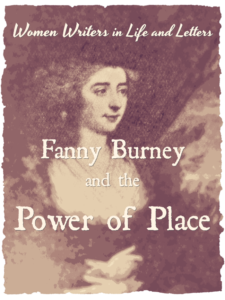 “… a hermitage, which is about an acre of ground—an island, planted with all variety of trees, shrubs and flowers that will grow in this country, abundance of little winding walks, differently embellished with little seats and banks; in the midst is placed a hermit’s cell, made of the roots of trees, the floor is paved with pebbles, there is a couch made of matting, and little wooden stools, a table with a manuscript on it, a pair of spectacles, a leathern bottle; and hung up in different parts, an hourglass, a weatherglass and several mathematical instruments, a shelf of books, another of wood platters and bowls, another of earthen ones, in short everything that you might imagine necessary for a recluse.”
“… a hermitage, which is about an acre of ground—an island, planted with all variety of trees, shrubs and flowers that will grow in this country, abundance of little winding walks, differently embellished with little seats and banks; in the midst is placed a hermit’s cell, made of the roots of trees, the floor is paved with pebbles, there is a couch made of matting, and little wooden stools, a table with a manuscript on it, a pair of spectacles, a leathern bottle; and hung up in different parts, an hourglass, a weatherglass and several mathematical instruments, a shelf of books, another of wood platters and bowls, another of earthen ones, in short everything that you might imagine necessary for a recluse.”
Mary Delany, Artist and Bluestocking, 1748
Every writer needs a PLACE to write. A position established in a calling accepted. An environment formed to cultivate thought. An atmosphere prepared to incubate inspiration and produce a harvest of words well crafted.
Little Fanny Burney, daughter of famous church organist and music teacher, Dr. Charles Burney, made a fortuitous escape from the debilitating effects of a girl’s boarding school. At the age of eight in 1760, she remained in the company of her grieving father after the death of her beloved mother. There, while her father taught students and wrote a history of music, she enjoyed active days of mental stimulation reading in his library. Evenings found their London home bustling with a host of accomplished personages of the day, including luminary talents of music, art, and peers such as the painter, Sir Joshua Reynolds, actor David Garrick, and the brilliant Dr. Johnson.
Growing up in this inspiring cultural environment, frequent engagement with such individuals, proved to be a fertile soil, feeding Fanny’s natural wonder, curiosity, and hunger for learning. By 1768, at the age of sixteen, she’d begun her writing in earnest with a diary of her days and thoughts on a myriad of topics. She drafted her first words during a visit to St. Margaret’s Churchyard in King’s Lynn, the earliest of her childhood homes where she once passed happy days with her well-read mother. The power of place in writing and inspiration further fed this novelist’s literate lifestyle, as recounted with bubbling joy:
“I am now writing in the pleasantest place belonging to this house. It is called sometimes the ‘Look Out’ as ships are observed from hence, and at other times the Cabin. It is at the end of a long garden that runs along the house. I always spend the evening, sometimes all the afternoon, in this sweet cabin, except sometimes, when unusually thoughtful, I prefer the garden. I cannot express the pleasure I have in writing when I first see them, and how I alter or confirm myself in them.”
Having little use for the obligatory trend of ‘paying calls,’ Fanny’s formative years required only a library, a challenging book for expanding her world, and one or two kindred spirit friends to share thoughtful conversation on her learning journeys. And—a variety of spaces to retreat with pen and paper: ‘I write now from a pretty neat little closet of mine that is in the bedchamber, where I keep all my affairs.’
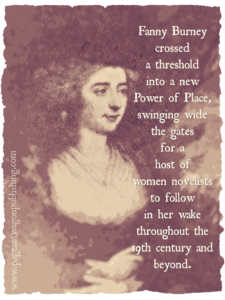 In the end, Fanny’s reams of writing observations regarding daily life and human observation, became the seedbed for her stories. She preferred her books, simple dress, and lifestyle to the expected employment of young ladies—the acquiring of a husband. In the day, becoming a wife would most certainly require her to put away her writing and learning, restricting the liberty to pursue what she most loved. By her mid-twenties in 1777, still single, she wrote her first novel, Evelina, or A Young Lady’s Entrance into the World, from the perspective of a seventeen-year-old girl. Largely based on the copious diary writings she’d recorded through the years, she wrote in secret, copying it by hand in the late hours of the night, unseen. When finished, she entrusted it to her brother, Charles. It was unheard of that a woman could publish a novel. However, if he presented it to a publisher as written by an anonymous friend, perhaps it may be approved.
In the end, Fanny’s reams of writing observations regarding daily life and human observation, became the seedbed for her stories. She preferred her books, simple dress, and lifestyle to the expected employment of young ladies—the acquiring of a husband. In the day, becoming a wife would most certainly require her to put away her writing and learning, restricting the liberty to pursue what she most loved. By her mid-twenties in 1777, still single, she wrote her first novel, Evelina, or A Young Lady’s Entrance into the World, from the perspective of a seventeen-year-old girl. Largely based on the copious diary writings she’d recorded through the years, she wrote in secret, copying it by hand in the late hours of the night, unseen. When finished, she entrusted it to her brother, Charles. It was unheard of that a woman could publish a novel. However, if he presented it to a publisher as written by an anonymous friend, perhaps it may be approved.
Indeed, in 1778, it was published to great sensation. Many attempted to guess who wrote such an entertaining and engaging story. None supposed it to be a woman. Eventually, her secret was exposed. Fanny Burney became famous throughout Europe and Evelina was translated into three languages. In fact, as recorded in her diary, when she learned that the highly esteemed Sir Joshua Reynolds and Edmund Burke sat up all night reading it, she rushed into the garden with delight, dancing a jig round the mulberry bush.
Fanny Burney crossed a threshold into a new power of place, swinging wide the gates for a host of women novelists to follow in her wake throughout the 19th century and beyond.
What is it that laid the foundation for one woman to break centuries of tradition in the arena of writing and publishing?
The Power of Place
Position—The Place of Literacy and Learning
Fanny’s life might have taken a different route if she had been forced to attend the boarding schools of the day, fitting young girls for exterior graces only, in anticipation for their expected place in society. The position of women in her time narrowed the world to that of securing a husband of means. Fanny’s education, however, revolved around the world of books, intelligent conversation, and artistic creativity. This was an unusual position for a woman. But when she accepted her calling, she took possession of her place in the world of literacy and learning, expanding to her full potential.
Environment—The Place of Extraordinary Mentors
In a boarding school, Fanny would have been subject to shared space with peers, all of the same age and ambitions. In her father’s house, however, Fanny was surrounded by the greatest minds in letters, art, and music of the age. Like a sponge, she soaked in the conversation and experience of historic achievers, shakers and movers on the world stage. Personal relationship rather than the rigor of routine cultivated her mind and natural intellectual abilities.
Atmosphere—The Place of Creative Inspiration
The muse of the writer learns to inspire in disheveled office spaces, cramped closets, and crowded subways. We are often required to create in less than inspiring settings. However, Fanny’s delight in finding beautiful locations within which to draw her pen and paper, visually stimulated by beauty and the peace of spirit it ministers, is readily grasped by writers of any age. Mary Delany sought the solace of a spartan hermitage. Fanny took joy in a picturesque “Look Out” or garden bench. Retreating to a peaceful setting allows our thoughts to settle, making way for inspiration to flow free.
Explore the following journal prompts to discover your PLACE as a writer:
Journal Prompt: How does the Power of Place work in your writing life? Have you fully accepted your calling and possessed your position as a woman of letters and learning? Why is living a well-read lifestyle important to writing? What sacrifices must you make to walk in your calling? How do you keep balance in your place as a writer and your place as a Christian, woman, wife, or mother? Who are the people you surround yourself with? How do they mentor and cultivate you in your calling? What must you do to seek out extraordinary mentors to enrich you as you grow? Where do you write and why? What can you do to create an inspiring location to physically do the work of a writer? Why is this important?
TWEET:[bctt tweet=”Discover the Power of Place as a woman writer! How #FannyBurney paved the way to possess your PLACE in life and letters. ” username=”@A3writers @misskathypwp”]
TWEET:[bctt tweet=”#Women Writers in Life and Letters—The Power of Place via #FannyBurney; Position, Environment, Atmosphere. ” username=”A3writers @misskathypwp”]
Reference: English Women in Life and Letters, by M. Phillips and W. S. Tomkinson, by Oxford Univertiy Press, Inc., 1927
Writer-speaker, Kathryn Ross, ignites a love of literature and learning through Pageant Wagon Productions and Publishing. She writes and publishes homeschool enrichment and Christian living books for home, church, and school. Her passion is to equip women and families in developing a Family Literacy Lifestyle, producing readers and thinkers who can engage the world from a biblical worldview. She blogs and podcasts at TheWritersReverie.com and PageantWagonPublishing.com. Connect with Miss Kathy on Facebook.

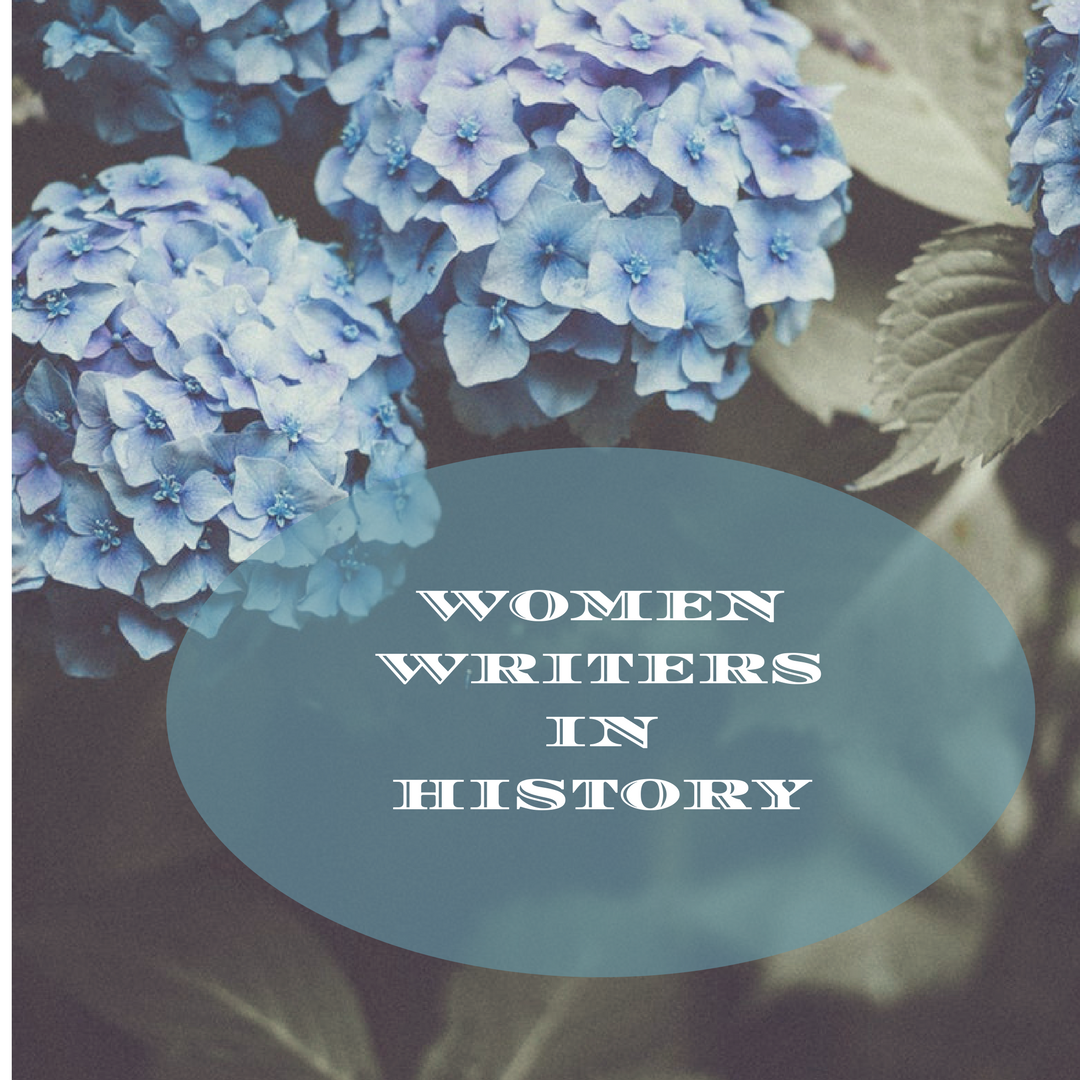
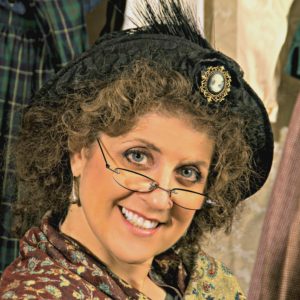
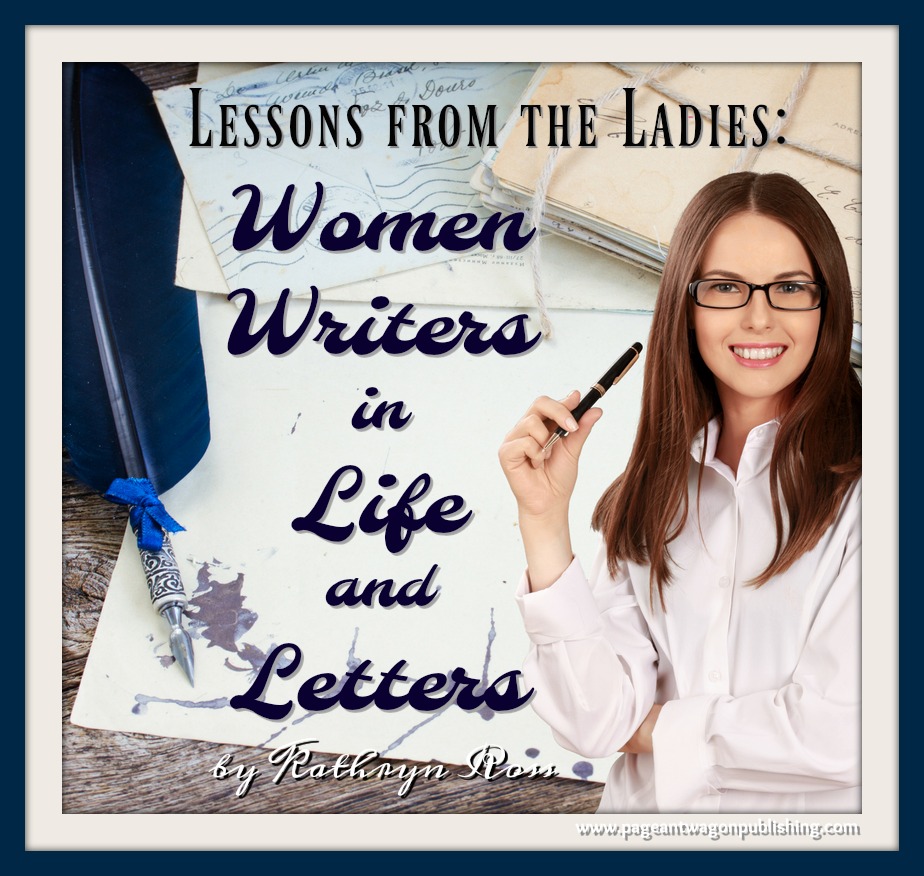


1 Comment
I love to have a sense of place in my life too. We all need to feel that we belong. Place also influences my writing. Thanks for sharing on the #LMMLinkup this week.